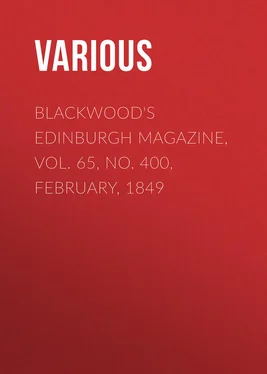Various - Blackwood's Edinburgh Magazine, Vol. 65, No. 400, February, 1849
Здесь есть возможность читать онлайн «Various - Blackwood's Edinburgh Magazine, Vol. 65, No. 400, February, 1849» — ознакомительный отрывок электронной книги совершенно бесплатно, а после прочтения отрывка купить полную версию. В некоторых случаях можно слушать аудио, скачать через торрент в формате fb2 и присутствует краткое содержание. Издательство: Иностранный паблик, Жанр: periodic, foreign_edu, Путешествия и география, на английском языке. Описание произведения, (предисловие) а так же отзывы посетителей доступны на портале библиотеки ЛибКат.
- Название:Blackwood's Edinburgh Magazine, Vol. 65, No. 400, February, 1849
- Автор:
- Издательство:Иностранный паблик
- Жанр:
- Год:неизвестен
- ISBN:нет данных
- Рейтинг книги:4 / 5. Голосов: 1
-
Избранное:Добавить в избранное
- Отзывы:
-
Ваша оценка:
- 80
- 1
- 2
- 3
- 4
- 5
Blackwood's Edinburgh Magazine, Vol. 65, No. 400, February, 1849: краткое содержание, описание и аннотация
Предлагаем к чтению аннотацию, описание, краткое содержание или предисловие (зависит от того, что написал сам автор книги «Blackwood's Edinburgh Magazine, Vol. 65, No. 400, February, 1849»). Если вы не нашли необходимую информацию о книге — напишите в комментариях, мы постараемся отыскать её.
Blackwood's Edinburgh Magazine, Vol. 65, No. 400, February, 1849 — читать онлайн ознакомительный отрывок
Ниже представлен текст книги, разбитый по страницам. Система сохранения места последней прочитанной страницы, позволяет с удобством читать онлайн бесплатно книгу «Blackwood's Edinburgh Magazine, Vol. 65, No. 400, February, 1849», без необходимости каждый раз заново искать на чём Вы остановились. Поставьте закладку, и сможете в любой момент перейти на страницу, на которой закончили чтение.
Интервал:
Закладка:
Thus immured, a prey to painful maladies, his clothes rotting on his emaciated limbs, the unhappy man moaned through his long and sleepless nights, and gave up hope of rescue. No tender-hearted Circassian maiden brought to him, as to the hero of Pushkin's well-known Caucasian poem, deliverance and love. Such luck had been that of more than one Russian captive; but poor Turnau, in his state of filth and squalor, was no very seductive object. He might have pined away his life in his cage, before Baron Rosen, or his paternal majesty the Czar, had recalled his fate to mind, but for an injury done by his merciless master to one of his domestics, who vowed revenge. Watching his opportunity, this servant, one day that the rest of the household were absent, murdered his lord, released the prisoner, tied him with thongs upon his saddle, upon which the baron, covered with sores and exhausted by illness, was unable to support himself, and galloped with him towards the frontier. In one day they rode eighty versts , (about fifty-four English miles,) outstripped pursuers, and reached Fort Ardler. The accounts given by Baron Turnau of the land of his captivity could be but slight: he had seen little beyond his place of confinement. What he did relate was not very encouraging to Russian invasion. He depicted the country as one mass of rock and precipice, partially clothed with vast tracts of aboriginal forest, broken by deep ravines and mountain torrents, and surmounted by the huge ice-clad pinnacles of the loftiest Caucasian ridge. The villages, some of which nestle in the deep recesses of the woods, whilst others are perched upon steep crags and on the brink of giddy precipices, are universally of most difficult access.
Dr Wagner, whose extremely amusing book forms the text of this article, has never been in Circassia, although he gives us more information about it, of the sort we want, than any traveller in that singular land whose writings have come under our notice. His wanderings were under Russian guidance and escort. During them, he skirted the hostile territory on more than one side; occasionally setting a foot across the border, to the alarm of his Cossacks, whose dread by day and dreams by night were of Circassian ambuscades; he has lingered at the base of Caucasus, and has traversed its ranges – without, however, deeming it necessary to penetrate into those remote valleys, where foreigners find dubious welcome, and whence they are not always sure of exit. He has mixed much with Circassians, if he has not actually dwelt in their villages. It were tedious and unnecessary to detail his exact itinerary. He has not printed his entire journal – according to the lazy and egotistical practice of many travellers – but has taken the trouble to condense it. The essence is full of variety, anecdote and adventure, and gives a clear insight into the nature of the war. Professedly a man of science, an antiquary and a naturalist, Dr Wagner has evidently a secret hankering after matters military. He loves the sound of the drum, and willingly directs his scientific researches to countries where he is likely to smell powder. We had heard of him in the Atlas mountains, and at the siege of Constantina, before we met him risking his neck along the banks of the Kuban, and across the wild steppes of the Caucasus. He has travelled much in the East, and prepared himself for his Caucasian trip by a long stay in Turkey and in Southern Russia. Well introduced, he derived from distinguished Russian generals, intelligent civilians, and Circassian chiefs, particulars of the war more authentic than are to be obtained either from St Petersburg bulletins, or from the ordinary trans-Caucasian correspondents of German and other newspapers, many of whom are in the pay of Russia. His African reminiscences proved of great value. The officers of the army of Caucasus take the strongest interest in the contest between French and Arabs, finding in it, doubtless, points of similitude with the war in which they themselves are engaged. Amongst these officers he met, besides Russians and Germans, several naturalised Poles and Frenchmen, Flemings and Spaniards, who gave in exchange for his tales of razzias and Bedouins, details of Circassian warfare which he highly prized, as likely to be more impartial than the accounts afforded by the native Russians. His own journey to the Caucasus took place in 1843; but a subsequent correspondence with well-informed friends, on both sides the Caucasian range, enabled him to bring down his sketch of the struggle to the year 1846.
Many English writers on Circassia have been accused of an undue preference for the mountaineers, of exaggerating their good qualities, and of elevating them by invidious contrasts with the Russians. There is no ground for suspecting a German of such partiality; and Dr Wagner, whilst lauding the heroic valour and independent spirit of the Circassians – qualities which Russian authors have themselves admitted and extolled – does not forget to do justice to his Muscovite and Cossack friends, to whom he devotes a considerable portion of his book, many of his details concerning them being extremely novel and curious. He carefully studied both Cossacks and Circassians, living amongst the former and meeting thousands of the latter, who go and come freely upon Russian territory. At Ekaterinodar, the capital of the Tchernamortsy Cossacks, the Friday's market swarmed with Circassians. In Turkey, and elsewhere, Dr Wagner had met many individuals of that nation, but this was the first time he beheld them in crowds. He describes them as very handsome men, with black beards, aquiline noses, and flashing black eyes. He was struck with their lofty mien, and attributes it to their mental energy, and to a consciousness of physical strength and beauty.
"This superiority of the pure Circassian blood does not belie itself under Russian discipline, any more than it does in Mahometan lands, where, as Mamelukes in Cairo, and as pashas in Stamboul, the sons of Caucasus have ever played a prominent and distinguished part. The Turk, who by certain imposing qualities awes all other Orientals, tacitly recognises the superiority of the Circassian ousden , or noble. The Emperor Nicholas, who preserves so rigid a discipline in the various corps of his vast army, shows himself extraordinarily considerate towards the Circassian squadrons of his guard. Persons well versed in the military chronicles of St Petersburg relate many a characteristic trait, proving the bold stubborn spirit of these Caucasian men to be still unbroken, and showing how it more than once has so imposed upon the emperor, and even upon the grand-duke Michael, reputed the strictest disciplinarian in Russia, that they have shut their eyes even to open mutiny. At a review, where the Caucasian cavalry formally refused obedience, the emperor contented himself with sending a courteous reproof by General Benkendorf. Beside the coarse common Russians, the Circassian looks like an eagle amidst a flock of bustards. Even capital crimes are not visited upon Circassians with the same severity as upon the other subjects of the emperor. A Circassian who had struck his dagger into the heart of a hackney-coachman at St Petersburg, in requital of an insolent overcharge, was merely sent back to the Caucasus. For a like offence a Russian might reckon upon the knout, and upon banishment for life to the Siberian mines.
"Amongst the Circassians at Ekaterinodar, a work , or noble, of the Shapsookian tribe, was particularly remarkable for his beauty and dignity. None of the picturesque figures of Arabs and Moors furnished me by my African recollections, could bear comparison with this Caucasian eagle. I afterwards saw, in Mingrelia, a more ideal mould of feature, resembling the antique Apollo type: but there the expression was too effeminate; the heroic head of the dweller on the Kuban pleased me better. I stood a good while before the Shapsookian, as if fettered to the ground, so extraordinary was the effect of his striking beauty. What a study, I thought, for a German painter, who would in vain seek such models in Rome; or for a Vernet, whose Arabian groups prove the great power of his pencil! The Arabs, rather priestly than knightly in their aspect, produce far less effect upon the large Algerine pictures at Versailles than the Circassian warrior would do in a battle-piece by such masters as Vernet or Peter Hess. The Shapsook chief at Ekaterinodar seemed conscious of his magnificent appearance. With proud mien, and that light half-gliding gait observable in most Caucasians, he sauntered amongst the groups of Cossacks upon the market-place, casting glances of profoundest scorn upon their clumsy sheepskin-wrapped figures. His slender form and small foot, the grace and elegance of his person and carriage, the richness of his costume and beauty of his weapons, contrasted most advantageously with the muscular but somewhat thickset figures, and with the ugly woolly winter dress of the Tchernamortsies. By help of a Cossack I made his acquaintance, and got into conversation. His name was Chora-Beg, and he dwelt at a hamlet thirty versts south of Ekaterinodar."
Читать дальшеИнтервал:
Закладка:
Похожие книги на «Blackwood's Edinburgh Magazine, Vol. 65, No. 400, February, 1849»
Представляем Вашему вниманию похожие книги на «Blackwood's Edinburgh Magazine, Vol. 65, No. 400, February, 1849» списком для выбора. Мы отобрали схожую по названию и смыслу литературу в надежде предоставить читателям больше вариантов отыскать новые, интересные, ещё непрочитанные произведения.
Обсуждение, отзывы о книге «Blackwood's Edinburgh Magazine, Vol. 65, No. 400, February, 1849» и просто собственные мнения читателей. Оставьте ваши комментарии, напишите, что Вы думаете о произведении, его смысле или главных героях. Укажите что конкретно понравилось, а что нет, и почему Вы так считаете.












